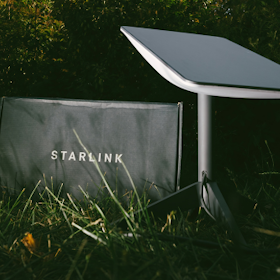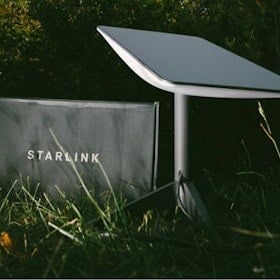According to the CRTC, a good internet speed is at least 50Mbps downloads and 10Mbps uploads. But defining a “good internet speed” mostly depends on how you use the internet: 50Mbps downloads will be perfectly fine for some and painfully slow for others.
Overall internet speed is determined by five major elements:
In this guide, we’ll break down how to pick determine the best internet speed for you, along with suggestions for improving your current internet speed and shopping for a faster plan.
What's a good internet speed in Canada?
According to the Canadian government, the minimum qualifications for a “good internet speed” are 50Mbps downloads and 10Mbps uploads. Keep in mind, though, that these are minimum qualifications: different households have different needs and, considering that, require different speeds.
Recommended internet speeds based on household
| Household | 1 person | 2-4 people | 4+ people |
|---|---|---|---|
| Web browsing | Yes | Yes | Yes |
| Streaming | Yes | Yes | Yes |
| Gaming | No | Yes | Yes |
| Minimum speed | 15Mbps | 50Mbps | 150Mbps |
Basic internet users who use primarily use the internet for web browsing and single-device streaming will find 50Mbps to be suitable. Gamers and larger households will want a plan over 150Mbps to avoid frustrating slowdowns.
Internet providers offer plans with speeds up to 8Gbps, but that’s not the reality for most Canadians because typical household routers are capped at 1Gbps. Even if someone’s paying for 8Gbps, that’s not a guarantee they're receiving it in their home.
Want to get a sense of how these numbers compare with your current setup? Use our internet speed test to check the speed of your plan.
What is download speed?
Download speed measures how quickly data travels from your internet service provider (ISP) to your home. Gamers and remote workers should aim for higher download speeds to ensure uninterrupted service.
Download speeds in Canada are as fast as 8Gbps (or 8,000Mbps), though speeds that fast are limited to fibre plans in cities and urban areas. Rural regions have historically seen slower download speeds, though Starlink recently began offering up to 150Mbps in remote areas of Canada.What is upload speed?
Upload speed reflects how fast your connection travels from your computer back to your provider's servers. Whenever you post a picture to Instagram, start a video chat, or play an online video game, you are "uploading." If you run a speed test, you'll likely notice your upload speed is much slower than your download speed. That's pretty normal, because far more online activity involves downloads than uploads.
10Mbps upload speed qualifies as a “good internet speed,” but avid gamers and crowded households with multiple devices will need something faster. If you’re looking for the fastest internet service provider in Canada, look for one that uses fibre optic or cable, like Altima’s 100/30Mbps plan or Virgin Plus’ 100Mbps plan, both of which provide enough bandwidth to keep streaming without issues.What is latency?
Latency is the delay between your computer sending a signal to its destination and then getting a response back. It's often referred to as your internet signal's "round-trip time." Latency is usually measured in thousandths of a second.
Hardcore gamers and remote workers want to avoid “lag,” which is a delay in service caused by high latency. If you’re one of those folks, it’s best to err on the side of caution and grab an internet plan with at least 150Mbps downloads.
What is a data cap?
Data caps dictate how much data you can use in a month before your service is slowed down or paused. Most internet plans in Canada include unlimited data.
Smaller carriers often offer lower prices paired with a hard data cap. In general, a plan with a 100GB data cap is good enough if you don’t stream a lot of Netflix.
Important note about wireless data caps
Wireless plans in Canada approach data very different. Unlimited data is rare to find with mobility and the definition of “unlimited” is more complicated than carriers often make it out to be. Interested in learning more? Check out our guide to the best unlimited data plans in Canada.
How do I improve my internet speed?
If you’re looking to improve your internet speed, you’ll need to look at both the technology bringing internet to your house and the hardware transmitting it to your devices inside. Let’s break down your options for internet connection type, followed by your choices for in-house hardware.
What's the fastest internet connection type in Canada?
Most internet plans in Canada offer one of four internet connection types in Canada: fibre, cable, satellite, and DSL. Fibre is the fastest option in terms of sheer numbers, but many cable plans can produce comparable speeds.
Fibre vs. cable vs. satellite vs. DSL speeds
| Technology | Download speed range | Upload speed range |
|---|---|---|
| Fibre | 250-8,000Mbps | 250-8,000Mbps |
| Cable | 10-1,500Mbps | 5-50Mbps |
| Satellite | 10-150Mbps | 1-20Mbps |
| DSL | 5-75Mbps | 1-30Mbps |
Speed isn’t everything, though. There are other factors to consider when evaluating the right internet connection type for you.
- Fibre optic internet offers the fastest speeds, though mostly limited to metropolitan areas.
- Cable internet is more common and offers download speeds comparable to fibre, though its upload speeds are often slower.
- Satellite internet is expanding by the day, offering high-speed internet to remote areas of the country that lack the infrastructure for fibre or cable.
- DSL internet is the most commonly available internet connection type and is often the cheapest, though its speeds are significantly slower than most fibre, cable, and satellite options.
What about Starlink internet?
Starlink internet, the high speed satellite internet provider powered by Elon Musk’s SpaceX, recently expanded their coverage map in Canada. If you’re looking for high speed service in rural areas, Starlink is your best bet, with straightforward plans that give you speeds comparable to what you can find in urban centres.
Get better internet inside your home
Getting better internet inside your home isn’t just based on the plan you activate; there are a few ways you can maximize your internet setup in your home to ensure the service delivered to your house is working to its full potential.
- Place your devices closer to your router. The closer you are to the source of your internet, the more likely it is that it’ll operate like it should. When installing the hardware, think about where you’ll most likely use your devices, including your computers, tablets, phones, and television.
- Purchase a Wi-Fi extender. Even if you’ve placed your router in a strategic location, there can still be intereference with your signal, leading to a poor connection. (This is especially true if you live in an apartment building or dormitory.) Wi-Fi extenders, like the TP-Link RE650 and the Netgear X7000, boost your signal, allowing you to experience the speeds your plan promised.
- Use a wired connection. Wi-Fi is convenient, but wired (ethernet) connections are the most reliable and secure way to connect to the internet.
Best internet plans in Canada
If you’re looking for a newer, faster, and better internet plan, you’ve come to the right place. We’ve collected all the best internet plans in Canada, with options from some of the country’s best internet providers, including oxio, Altima, VMedia, Bell, and Virgin Plus.
We’re especially fond of oxio’s Internet 100 plan, which offers 100Mbps downloads, 10Mbps uploads, and unlimited data. oxio’s developed a strong reputation for their no-nonsense approach to customer service and transparency, vowing to avoid the hidden fees and price hikes of other providers.
Something for something more affordable or more practical? We’ve also got a list of the best cheap internet plans, organized by province. If you want to see what plans other Canadians trust, you can find the most popular internet plans in Canada below.
What is a good internet speed?: FAQs
Related Articles
Find Better Internet and Phone Plans
Hundreds of internet plans unpacked. All the facts. No surprises.
Internet Providers by Provinces and Territories
- Internet in Alberta
- Internet in British Columbia
- Internet in Manitoba
- Internet in New Brunswick
- Internet in Newfoundland and Labrador
- Internet in Northwest Territories
- Internet in Nova Scotia
- Internet in Nunavut
- Internet in Ontario
- Internet in Prince Edward Island
- Internet in Quebec
- Internet in Saskatchewan
- Internet in Yukon Territory















































